Oregon Decriminalizes Drugs, Invests in Health (2020)
Oregon became the first state in the nation to decriminalize drug possession and expand health services when voters passed Measure 110 in 2020. Our analysis shows that drug possession arrests dropped by the thousands, and hundreds of millions in funds expanded addiction services and other social supports, accessed by tens of thousands of people during its first few years. Drug Policy Action spearheaded this historic campaign.
Unfortunately, drug possession in Oregon was recriminalized after a well-funded disinformation campaign. But Oregon is in a better place than it was prior to Measure 110, when penalties for possession were more severe. Even the proponents of its rollback admitted that Measure 110 successfully expanded service provision, agreeing the services it created must stay in place.
DPA Legalizes Marijuana for Adult Use Across the U.S. (2012)
Colorado and Washington were the first states to legalize marijuana in 2012. Drug Policy Action worked closely with allies to draft these initiatives, build coalitions, and raise funds. In California in 2016, Proposition 64 legalized marijuana in the nation’s largest state. It was the first model to promote social equity and undo harms. This included retroactive sentencing reform and expungements for marijuana offenses and favoring small-scale producers to prevent monopolies. Tax revenue funded substance use treatment for youth, environmental restoration, research, and more. It funded the California Community Reinvestment Program benefiting those most harmed by the drug war. It also created strict packaging, testing, and advertising standards to protect consumers and youth. Drug Policy Action played a leading role from funding to co-drafting the initiative to coordinating political mobilization. We are only organization that was instrumental in all the first 15 victorious campaigns to legalize marijuana for adult use.
California Prioritizes Treatment Over Jail and Prison (2000)
Enacted by voters in 2000, Proposition 36 was the first significant sentencing reform since the start of the drug war. The law allows people with first or second-time convictions for drug possession to receive treatment services instead of jail or prison time. It has prevented the incarceration of tens of thousands of people, invested hundreds of millions of dollars into treatment, and saved the state billions in prison costs. Drug Policy Action drafted the ballot initiative and ran the campaign to pass it.
